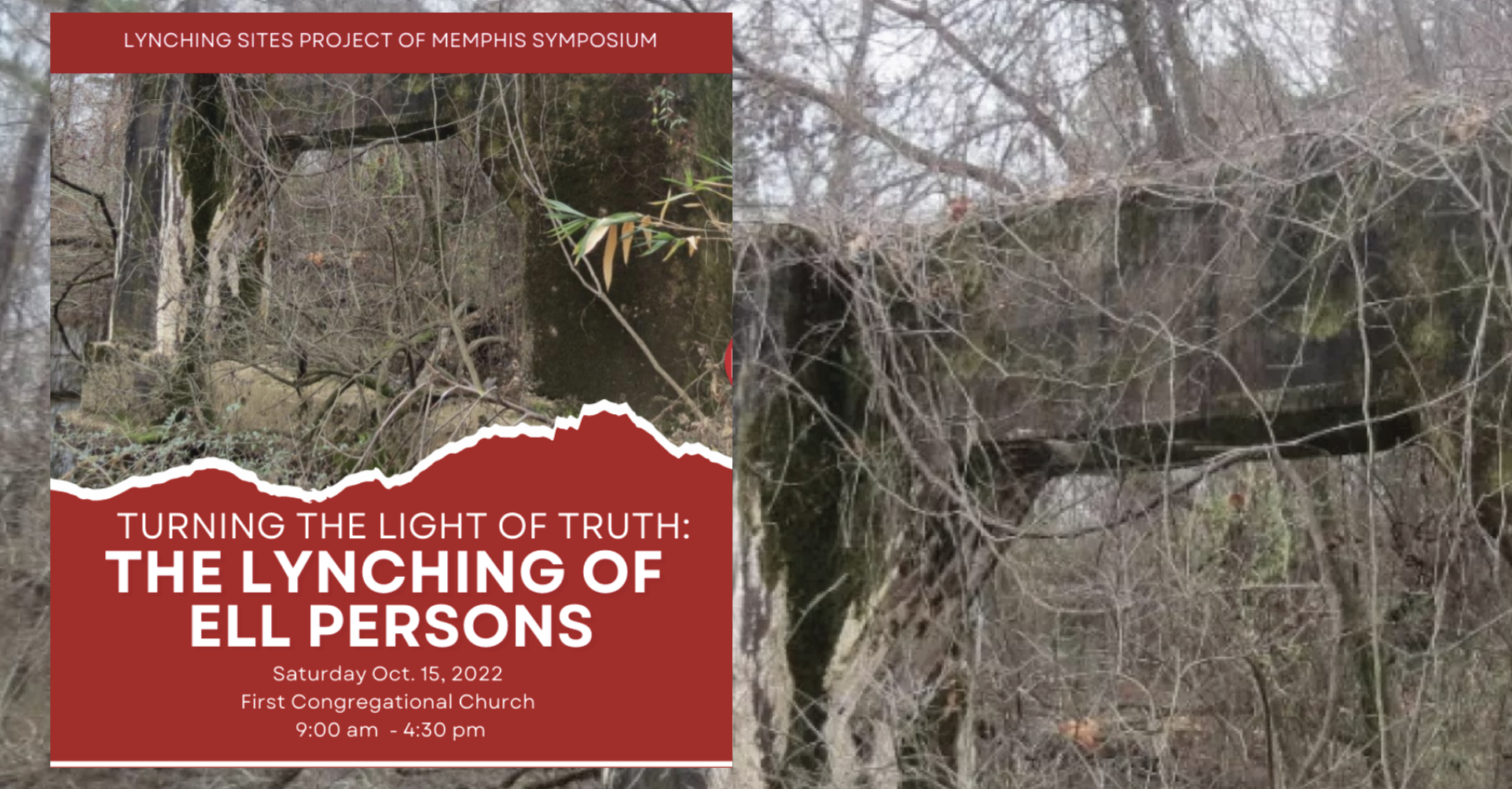StoryBoard is proud to support the work of the Lynching Sites Project.
Turning the Light of Truth: The Lynching of Ell Persons
On May 22, 1917, local woodcutter Ell Persons was lynched at the old Macon Road bridge near present-day Summer Avenue. He was accused of murdering a young white student whose body was found at the same location earlier that month. Despite the lack of evidence linking him to the crime, Persons was abducted from sheriff’s deputies by a white mob and burned to death in front of a crowd of thousands. The murder was announced in the newspapers leading up to the day, ensuring a crowd of thousands in attendance to watch the killing.
The Lynching Sites Project of Memphis believes that if Memphians together can face the horror and terror of lynchings head-on, people will be empowered to face all the other challenges in Memphis with courage, humility and hope. On October 15, 2022, we invite the entire Memphis community to join the Lynching Sites Project for a Symposium on the life and 1917 lynching of Ell Persons, and to illustrate the needs for its inclusion in the National Park Service system. You can find registration information on our website (lynchingsitesmem.org) and by clicking here to register for this symposium. This symposium will feature speakers from a range of backgrounds to ensure a robust discussion on the shadow cast by Ell Person’s lynching over a century later.
A Symposium to engage courageous conversation about the shadow cast by Ell Person’s lynching
Date: Saturday, October 15, 2022 – 9:00am to 4:30pm
Visit this link to register for the symposium.

Panels and speakers will include:
Panel 1: “Unknown Causes at the Hands of Unknown Persons”: The Lynching of Ell Persons and Other Victims (9:15 am – 10:40 am) Moderated by Iris Love-Scott (LSP Board Member)
● Darius Young, PhD (Associate Professor of History, Florida A&M University)
● Phyllis Aluko (Chief Public Defender for Shelby County, NAACP Board Member)
● Kelsey Lamkin (Historic Preservationist, LSP Board Member)
Panel 2: Telling the World the Facts: Journalism’s Role in Lynching Culture from Ida B. Wells to Today (10:50 am – 12:15 pm) Moderated by Rev. Dr. LaSimba Gray (Benjamin L. Hooks Institute for Social Change, University of Memphis Board Member)
● Prof. Otis Sanford (Hardin Chair of Excellence in Economic and Managerial Journalism, University of Memphis, Political Commentator, WREG-TV)
● Laura Kebede (Distinguished Journalist in Residence, Institute for Public Service Reporting at University of Memphis)
● Karanja A. Ajanuka (Executive Director, Tri-State Defender)
Panel 3: To Save Our Bodies and Our Souls: Teaching Lynching History in 2022 (1:15 pm – 2:40pm) Moderated by Dr. Timothy Huebner (Associate Provost and Sternberg Professor of History at Rhodes College, LSP Board Member)
● Charles McKinney (Neville Frierson Bryan Chair of Africana Studies and Associate Professor of History, Rhodes College)
● Sarah K. Stuart (Associate Program Director, Memphis/Southeast Facing History and Ourselves)
● Khari Bowman (Overton High School Alumna)
● Myles Franklin (Central High School Alumnus)
Panel 4: Confronting the Legacy of Lynching: A Conversation among Descendants (2:50 – 4:30) Moderated by Rich Watkins (Medtronic, Inc. Sr. Principal Legal Counsel and LSP Board President) and Laura Faith Kebede (Distinguished Journalist in Residence, Institute for Public Service Reporting at University of Memphis)
● Michele Whitney (Descendant of Persons Family)
● Laura Wilfong Miller (Descendant of Rappel Family)
● Steve Haley (Descendant of Lynching Spectator)
The unusual level of documentation in Ell Persons’s lynching has allowed the Lynching Sites Project of Memphis to find the exact location of the site, a rarity when researching lynching sites. Despite the numerous lynchings that have been recorded in the late nineteenth and early twentieth centuries, the vast majority left no records of where they took place, and in some cases, even the names of the victims have been lost. LSP has worked diligently to document the site, and now seeks to preserve it as well. To this end, LSP has partnered with Congressman Steve Cohen of Memphis to support his Evaluating Lynching Locations (ELL) for National Park Sites Act, which would direct the National Park Service to study lynching sites in and around Memphis for possible inclusion in our park system.
LSP believes that the Ell Persons Lynching Site would fill a dearth of recognized sites of African American significance. Of 95,000 entries on the National Register of Historic Places, only two percent of those represent African American history. Although lynching is recognized in the framework under the criminal justice theme, there are no NPS national historic landmarks related to racial terror lynchings. Memphis is undoubtedly an appropriate location for the country’s first National Historic Landmark dedicated to lynching history. Until the United States deals with this trauma, there can be no healing. Without healing, there can be no reconciliation. Without reconciliation, there can be no justice.
For more details, and to subscribe to the Lynching Sites Project newsletter, visit this link.

